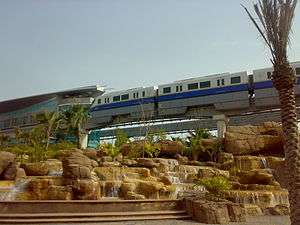Palm Jumeirah Monorail
|
Dubai Monorail, 2009 | |||
| Overview | |||
|---|---|---|---|
| Locale | Dubai | ||
| Transit type | straddle-beam monorail | ||
| Number of lines | 1 | ||
| Number of stations | 4 (2 not open), 1 planned | ||
| Daily ridership | ~40,000 (capacity), under contemporary interval 23,000. Current ridership much lower. | ||
| Website |
www | ||
| Operation | |||
| Began operation | April 30, 2009 | ||
| Operator(s) | Serco Group plc | ||
| Number of vehicles | 4 (2009)[1] (only two visually seen in July 2014) | ||
| Technical | |||
| System length | 5.45 kilometres (3 mi)[2] | ||
| Average speed | 35 km/h | ||
| Top speed | 70 km/h | ||
| |||

The Palm Jumeirah Monorail is a monorail line on the Palm Jumeirah island in Dubai, United Arab Emirates. The monorail connects the Palm Jumeirah to the mainland, with a planned further extension to the Red Line of the Dubai Metro.[2] The line opened on April 30, 2009.[3] It is the first monorail in the Middle East.[4]
The trains are driverless, with attendants for any emergency situations.[1]
History
Construction began on the 5.45-kilometre (3 mi) monorail line in March 2006,[2] under the supervision of Marubeni Corporation, with the monorail track completed in July 2008 and vehicle testing beginning in November 2008. Originally planned to open by December 2008,[5] the opening was delayed to April 30, 2009.[2][5] In 2010, day-to-day operations were taken over by the Middle-East branch of Serco.[6]
The project budget is US$400 million, with an additional US$190M set aside for a 2-kilometre (1 mi) future extension to the Dubai Metro.[7] Another source speaks of a budget of US$1.1 billion.[8] A journey on the monorail costs Dhs15 one-way, 25 return.
Technology
The Palm Jumeirah Monorail uses Hitachi Monorail straddle-type technology. The line has a theoretical capacity of 40,000 passengers per day, with trains running every few minutes during peak hours and every 15 to 20 minutes during off-peak hours.[2][4] However, actual ridership averaged around 600 passengers per day during the first week,[9] and the monorail is running "virtually empty".[10] In July 2014, frequency was down to every 23 minutes with only one of two trains operating[11] The electro-mechanical works are carried out by ETA-Dubai in joint venture with Hitachi-Japan.
Stations
As of May 2009, only the Atlantis Aquaventure and Gateway stations are open.[8]
- Atlantis Aquaventure station — Atlantis, The Palm*
- Palm Mall station (not open yet) — formerly Trump Plaza, now Village Center Station (still not open in November 2014)
- Trump Tower station (not open yet) — Trump International Hotel and Tower, renamed to Al Ittihad Park in November 2012 (still not open in November 2014)
- Gateway station — Gateway Towers, connection to Dubai Tram at Palm Jumeriah station
Planned extension:
- Dubai Internet City (planned) — connection to Dubai Metro
References
- 1 2 Hitachi Ltd. "Monorail in Palm Jumeirah Island opened in April 2009". Retrieved 18 April 2016.
- 1 2 3 4 5 "Middle East's first monorail to start services in Palm Jumeirah by April". Gulf News. 2008-08-07. Retrieved 2008-08-11.
- ↑ "Palm monorail tried and tested - The Knowledge News". TimeOutDubai.com. Retrieved 2010-08-27.
- 1 2 "ME's 1st monorail to begin services in April". MENAFN.com. 2008-08-08. Retrieved 2008-08-11.
- 1 2 "Palm monorail hit by four-month delay". ArabianBusiness.com. 2008-07-22. Retrieved 2008-08-11.
- ↑ DVV Media UK. "Urban rail news in brief September 2010". Railway Gazette. Retrieved 18 April 2016.
- ↑ "Quiet please for region's first monorail". ArabianBusiness.com. 2007-04-07. Retrieved 2008-08-11.
- 1 2 "Nice and Easy, but Fares Not So Fair". Khaleejtimes.com. 2009-05-07. Retrieved 2010-08-27.
- ↑ Sarah Blackman (2009-05-06). "Dubai's new Palm Monorail proves popular". ConstructionWeekOnline.com. Retrieved 2010-08-27.
- ↑ "Palm monorail: Where are the passengers? - XPRESS (United Arab Emirates)". Encyclopedia.com. 2009-05-27. Retrieved 2010-08-27.
- ↑ visit
External links
![]() Media related to Palm Jumeirah Monorail at Wikimedia Commons
Media related to Palm Jumeirah Monorail at Wikimedia Commons
